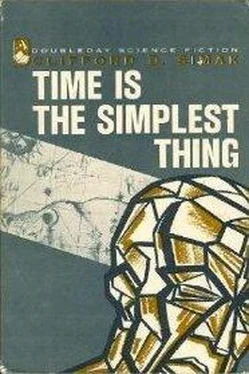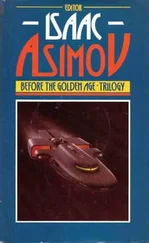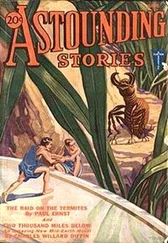Then he dived back home again, back into the dark and warmness, and Blaine stood shorn of all but his human self in a place of foggy nothingness.
There was nothing there — nothing but himself and the star machine. He reached out his hand and touched the star machine and it was very solid. It was, so far as he could see, the only solid thing there was.
For the fog itself, if fog were what it was, had an unreal quality, as if it were striving to camouflage its very fact of being.
Blaine stood quietly, afraid to move — afraid that any movement might plunge him into some pit of black foreverness.
For this, he realized, was the future, it was a place without a single feature of the space-time matrix that he knew. It was a place where nothing yet had happened — an utter emptiness. There was neither light nor dark; there was nothing here but emptiness. There had never been anything in this place, nor was anything ever intended to occupy this place — until this very moment when he and his machine had been thrust upon it, intruders who have overstepped their time.
He let his breath out slowly and breathed in again — and there was nothing to breathe in!
Blackness rushed in upon him, and the throbbing of his heartbeat was loud within his head, and he reached out desperately to grab at something — at anything — in this place where there was not a thing to grab.
Even as he did, the alienness came back, a startled, frightened alienness, and a hodgepodge of queer symbolic figures, which even in his agony of mind, he took to be some outré mathematics, went flooding through his brain.
There was air again to breathe and there was solid floor beneath his feet and he smelled the mustiness of the inside of the highway shed.
He was back home again and so was the alienness, for it was gone from him. Back, he told himself, to the darkness and the warmth inside his very brain.
He stood erect and mentally checked himself and he was all right. He opened his eyes slowly, for they somehow had been closed, and there was only darkness until he remembered the flashlight still clutched in his hand. And yet not as dark as it had been before. Now light from a newly risen moon poured through the broken window.
He lifted the flashlight and shoved the contact button, and the light sprang out and the machine was there before him, but strange and unsubstantial — the ghost of a machine, the trail that it had left behind it when it had moved into the future.
He lifted his free arm and used his jacket sleeve to wipe his forehead dry. For it was over now. He had done what he had come to do. He’d struck the blow for Stone; he’d stopped Finn in his tracks.
There was here no object lesson; there was no longer any text for Finn to preach upon. There was, instead, a mocking jeer from the very magic that Finn had fought for years.
Behind him he sensed a movement and he swung around so hurriedly that his fingers loosened on the flashlight and it fell upon the floor and rolled.
Out of the darkness a voice spoke.
“Shep,” it said, with full heartiness, “that was very neatly done.”
Blaine froze and hopelessness flooded in.
For this was the end, he knew. He had come as far as he was going to. He had finally run his race.
He knew that hearty voice. He never could forget it.
The man standing in the darkness of the shed was his old friend, Kirby Rand!
Rand was a blacker blob in the darkness as he stepped forward and picked the flashlight off the floor. He pivoted to turn the light full upon the star machine and in the flood of brightness tiny little dust motes could be seen dancing in the heart of the machine.
“Yes,” said Rand, “very neatly done. I don’t know how you did it and I don’t know why you did it, but you most certainly have taken care of it.”
He turned the flashlight off and for a moment they stood silent in the darkness, relieved by the streaks of moonlight that came through the windows.
Then Rand said: “I suppose you know that Fishhook owes you a vote of thanks for this.”
“Come off of it,” Blaine told him, roughly. “You know very well it was not done for Fishhook.”
“Nevertheless,” said Kirby, “it happens that in this particular area our interests coincide. We could not let this machine stay lost. We could not allow it to remain in improper hands. You understand, of course.”
“Perfectly,” said Blaine.
Rand sighed. “I had expected trouble and if there is anything Fishhook doesn’t want, it’s trouble. Particularly when that trouble is out in the hinterlands.”
“There’s not been any trouble,” Blaine told him, “that needs to worry Fishhook.”
“I am glad to hear it. And you, Shep? How are you getting on?”
“Not too badly, Kirby.”
“That is nice,” said Kirby. “That is very nice. It makes me feel so good. And now, I would imagine, we should get out of here.”
He led the way across the floor back to the broken window and stood aside.
“You first,” he said to Blaine, “and I’ll be right behind you. I would ask, as one friend to another, that you not try to run away.”
“No need to fear,” Blaine told him dryly, then climbed quickly through the window.
He could run, of course, he told himself, but that would be extremely foolish, for there was no doubt Rand would have a gun and he would be quite efficient with it, even in the moonlight. And more than that, if there were any shooting, Harriet might come running to be of what help she could and if she got involved in this, then he’d be truly friendless. Otherwise, he told himself, almost prayerfully, Harriet would stay hidden in the willow clump. She would see what happened and in just a little while she’d have an angle figured out.
Harriet was, he told himself, the only hope he had.
He dropped out of the window and stood to one side for Rand to clamber through.
Rand hit the ground and turned toward him, just a bit too quickly, too much like a hunter, then he relaxed and chuckled.
“It was a slick trick, Shep,” he said. “Efficiently engineered. Someday you’ll have to tell me exactly how you did it. To steal a star machine is not an easy thing.”
Blaine gulped down his astonishment, and hoped the moonlight hid the look he knew must be upon his face.
Rand reached out a hand and took him companionably by the elbow.
“The car’s down here,” he said. “Right down by the road.”
They walked together across the patch of rustling weeds, and the land lay different now, no longer dark and fearsome, but a place of painted magic stretched out in the moonlight. To their right lay the town, a mass of darkened houses that looked more like mounds than houses, with the faint tracery of nude trees standing up like ragged paintbrushes reared against the eastern sky. To the west and north lay the silver prairie land, flat and featureless and made immense by its very lack of features.
And just down the road was the clump of willows.
Blaine shot a quick glance at the clump and there were only willows. There was no glint of moonlight bouncing off metal. He walked a pace or two, then took another look and this time, he knew, there could be no mistake. There was no car in that clump of willows. Harriet was gone.
Good girl, he thought. She had a lot of sense. She’d probably gotten out of there as soon as Rand showed up. She’d figure, more than likely, that the one way she’d be most valuable would be to make a getaway against another day.
“I don’t suppose,” said Rand, “that you have a place to stay.”
“No,” said Blaine, “I haven’t.”
“Bad town,” Rand told him. “They take this witchcraft-werewolf business seriously indeed. Cops stopped me twice. Warned me under cover. Told me very sternly it was for my own protection.”
Читать дальше








